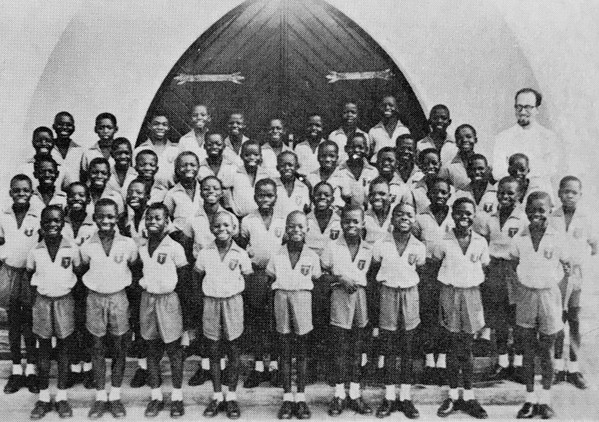


NEWS:
Only 2 days left to hear our September stream - otherwise go to MixCloud to listen but without detailed artist/gig info
Artist Info
|
Les Troubadours du Roi Baudouin  Image from Discogs  The Missa Luba is a version of the Latin Mass based on traditional Congolese songs. It was arranged by Father Guido Haazen, a Franciscan Friar from Belgium, and originally performed and recorded in 1958 by "Les Troubadours du Roi Baudouin", a choir of Congolese children from Kamina The Missa Luba is a version of the Latin Mass based on traditional Congolese songs. It was arranged by Father Guido Haazen, a Franciscan Friar from Belgium, and originally performed and recorded in 1958 by "Les Troubadours du Roi Baudouin", a choir of Congolese children from KaminaThe "Kyrie" and the "Credo" are wholly elaborated like the "kasalas" which are still performed according to the Ngandanjika (Kasai); the "Sanctus" and the "Benedictus" were inspired by a magnificent "Parting-song in Kiluba." The "Gloria" is improvised in the typical Kiluba-style of the Katanga. The "Hosannah" is a genuine rhythmic dance of the Kasai, and the "Agnus Dei" is a typical Bena Lulua (Luluabourg) song. Originally the music was not written. The composition was the result of general cooperation and of a spontaneous inspiration. Later, sheet music of Haazen's arrangement was published. In the "Credo" the text (the crucifixion and the death of the Redeemer) is preceded by the usual announcement of death, first on the Kyondo and then on the Kikumvi (Tom-Tom). Then follows a genuine "kilio" (elegy - dead-song) without percussion accompaniment, sung by the solo voice. The doleful tone is stressed by the repeated and sustained o-sounds ("... etiam prono ... bis, sub Pontio Pilato... ). The Missa Luba was created by Baluba of the Kasai and Katanga, with Father Haazen. Read more on Last.fm. User-contributed text is available under the Creative Commons By-SA License; additional terms may apply. Artist biography from last.fm Some other places to look for information: last.fm Discogs MusicBrainz |
